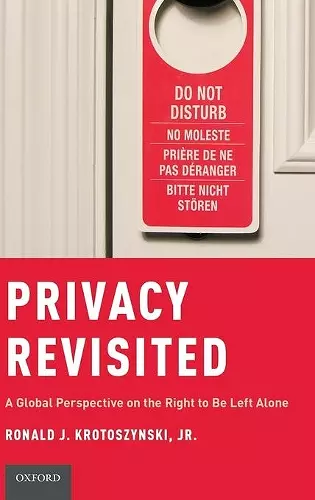Privacy Revisited
A Global Perspective on the Right to Be Left Alone
Format:Hardback
Publisher:Oxford University Press Inc
Published:16th Jun '16
Should be back in stock very soon
This hardback is available in another edition too:
- Paperback£33.99(9780190876913)

Rapid technological change, the advent of Big Data, and the creation of society-wide government surveillance programs have transformed the accessibility of highly personal information; these developments have highlighted the ambiguous treatment of privacy and personal intimacy. National legal systems vouchsafe and define "privacy," and its first cousin "dignity," in different ways that reflect local legal and cultural values. Yet, in an increasingly globalized world, purely local protection of privacy interests may prove insufficient to safeguard effectively fundamental autonomy interests - interests that lie at the core of self-definition, personal autonomy, and freedom. Privacy Revisited articulates the legal meanings of privacy and dignity through the lens of comparative law, and argues that the concept of privacy requires a more systematic approach if it is to be useful in framing and protecting certain fundamental autonomy interests. The book begins by providing relevant, and reasonably detailed, information about both the substantive and procedural protections of privacy/dignity in the U.S., Canada, South Africa, the United Kingdom, and among Council of Europe member states. Second, the book explores the inherent tension between affording significant legal protection to the right of privacy (or human dignity) and securing expressive freedoms, notably including the freedom of speech and of the press. The author then posits that the protection of privacy helps to illuminate some of the underlying social and political values that lead the U.S. to fail to protect privacy as reliably or as comprehensively as other liberal democracies. Finally, the book establishes that although privacy and speech come into conflict with some regularity, it is both useful and necessary to start thinking about the important ways in which both rights are integral to the maintenance of democratic self-government.
For those seeking a lucid analysis of the development (or lack thereof) of constitutional privacy law in the jurisdictions considered, Krotoszynski provides a comprehensive and thought-provoking overview ... Privacy Revisited is required reading for academics and practitioners looking to develop their understanding of constitutional privacy law across Western liberal democracies. * Joe Purshouse, University of East Anglia (Cambridge Law Journal) *
Privacy Revisited is a truly remarkable book. Successfully deploying an analytic approach which is both comparative and contextual is a wonderful achievement in itself, but Krotoszynski does more. He offers a framework for thinking about privacy as a global human right. In so doing, he shows that the way privacy is understood in the United States means that privacy is protected neither 'as reliably or as comprehensively' as it is in other liberal democracies. This argument is bracing and persuasive, and it makes a singularly important contribution to scholarship and public discourse. * Austin Sarat, Associate Dean of the Faculty, William Nelson Cromwell Professor of Jurisprudence & Political Science, and Director, Mellon Project on Student-Faculty Research, Amherst College *
Professor Krotoszynski provides a valuable overview of how several constitutional systems accommodate competing interests in privacy, speech, and democracy. He shows how scholarship in comparative law can help one think about one's own legal system while remaining sensitive to the different cultural and institutional settings of each nation's law. A very useful contribution. * Mark Tushnet, William Nelson Cromwell Professor of Law, Harvard Law School *
I loved the book because it is such a smart and dynamic engagement with comparative law's current malaise... In this wide-ranging work we see the challenges, shortcomings, and promise of [several] competing approaches to comparative law. Who among us hasn't struggled with this, the comparatist's fundamental dilemma? Too few of us are willing to live that struggle so openly and honestly as Krotoszynski. He has given us a compelling invitation to keep hammering away at that methodological and theoretical problem. Whatever we might mean by privacy, Krotoszynski isn't going to let us mask our disciplinary challenges. * Russell Miller, Jotwell *
ISBN: 9780199315215
Dimensions: 155mm x 236mm x 31mm
Weight: 567g
312 pages